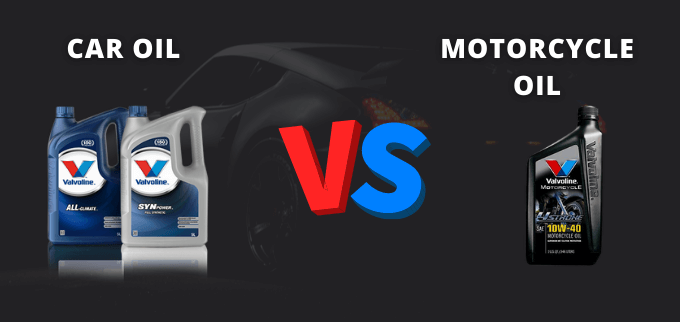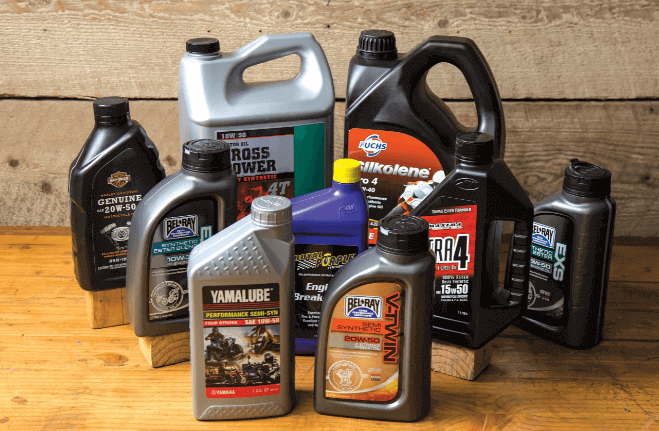If you have a motorcycle, you should know the importance of using the appropriate oil. However, if you can’t get any motorcycle oil, one of the questions that will pop up in your mind is, can you use car oil in a motorcycle? What effect will it have on your motorcycle engine? Let us find out!
You can use car oil on your Motorcycle if you do not have any other options available. I found it a good option whenever I couldn’t get a motorcycle oil. However, it should be a temporary thing and not one that you do regularly.
Using car oil in a motorcycle may lead to an engine with bad running quality and struggles to start. So, you should make it a temporary thing. Always ensure you look out for a motorcycle oil and only opt for car oil if all effort is proved abortive.
One important thing you need to know is that both motorcycle oil and car oil are very similar. However, they are different in some ways, and that is why you should never allow any seller to fool you into buying the wrong oil.
Car Oil Vs. Motorcycle Oil : Differences Between The Two
When it comes to protecting your car or motorcycle engine, oil is your best friend. Oil reduces friction between moving parts and absorbs heat from the combustion chamber.
But when it comes to selecting which oil you should use for your engine, knowing the differences between car oil and motorcycle oil can make a big difference.
Oil may seem like a simple fluid, but there are many different types of automotive lubricants on the market. And the one you choose will mean the difference between a happy engine and a smoked piston.
Below are measures that help you understand the difference between the two oils
Oil Lubrication
One of the main differences between car oil and motorcycle oil is lubrication. Because cars have more moving parts than motorcycles, car oil is designed to lubricate the engine. On the other hand, motorcycle oil lubricates all internal parts and engines.
Both car and motorcycle oil are designed for the same purpose, to lubricate your engine to keep it running efficiently. Having clean motor oil in your bike or car protects moving parts from wear and tear in engines. In addition, it protects them from friction caused by metal-to-metal contact.
Viscosity
Viscosity is one of the main differences between oil for cars and motorcycles. It refers to how thin or thick the oil is, so different engines require different types of viscosity. Motorcycles have a smaller engine than a car, which means the oil viscosity needs to be thinner for your engine to start easily at a low temperature.
However, since motorcycle engines idle at much higher speeds than car engines, there must be sufficient resistance to flow. Car oil is thicker, with a higher viscosity than motorcycle oil. It helps keep the engine in a car lubricated while in use.
At the same time, motorcycles need lighter oil to move more quickly between different mechanisms on the bike.
Friction Level
Car engine oils and motorcycle engine oils are both made to reduce their internal friction. Friction is the force that grinds against moving parts, causing them to wear out.
So, when choosing motor oil for your vehicle, the friction level must be compatible with your engine. Although both oils are great for reducing heat and friction, car oils have a lower friction level than motorcycle oils.
Ash Content
One major difference between car oil and motorcycle oil is the ash content. Car oil has a higher ash content, while motorcycle oil has a lower ash content. The short explanation is that cars’ emission equipment needs the ash to help keep it clean and working properly, so car oil has more than motor oil.
Cooling
All engines produce tremendous amounts of heat, which must be constantly removed. Therefore, the engine’s radiator of a car will continually circulate water with a coolant additive throughout the engine block and cylinder heads.
The cooling system on your car is very different from a motorcycle. A car’s cooling system has a radiator, water pump, and a thermostat fanned by the wind. On the other hand, motorcycles use air to cool their engine oil, with an oil cooler and maybe an oil cooler fan.
Car Oil lubricates the engine, and coolant, or antifreeze, prevents the engine from overheating. But with the motorcycle bike, the engine oil is responsible for all. It will keep the engine working and also cool it down.
Can You Use Car Oil In A Motorcycle?
You can use car oil on your motorcycle, but the performance may be slightly different. Many people think that car oil and motorcycle oil are very similar, but typically the oil companies produce a separate version for motorcycles.
Car oil and motorcycle oil are similar but have differences, and there are a few drawbacks to using car oils in motorcycles. Both motorcycle and car oil use similar additives that improve engine protection. But car oil has a different viscosity than motorcycle oil.
You need to avoid costly damage by understanding the importance of engine oil in your motorcycle. Therefore, you should use the required oil for your motorcycle.
Always check the manual and use the oil rating recommended by the manufacturer
What Happens if You Use Car Engine Oil Too Much in Your Motorcycle?
Motorcycle engines differ from car engines and therefore require oil specifically designed for them. If you use car engine oil in your motorcycle engine, you will likely experience a drop in performance. And if you use too much in your motorcycle, it can eventually cause permanent damage.
Here are some damages you can experience using car oil on your motorcycle
Damage to The Clutch Plate
If you use car engine oil too much in your motorcycle, it will damage the clutch plate.
Your car’s engine oil has additives that are harmful to the motorcycle engine. Therefore, car oil in a motorcycle will damage the clutch plate by blocking the clutch friction material. The problem with the additives is that they leave deposits on the engine’s metal surfaces.
Also, if you use car engine oil in a motorcycle for too long, be prepared for costly repairs to the clutch plate. It reduces the friction between the driven and driving parts, so the clutch can no longer interfere with smooth gear shifts.
Your motorcycle gears will slip into each other without any engagement power. The rigid ceramic plates will not withstand this misuse. If you ride your bike like this for too long, you are likely to destroy your drivetrain entirely and ruin the engine.
Damage to The Motorcycle Engine
The excessive use of car engine oil in a motorcycle will damage the motorcycle engine. The oil is too thick and usually contains an additive package that can shorten the engine’s life by plugging oil passages or causing rings to stick in their grooves and fail to seal, which results in higher oil consumption and loss of compression.
It is not that difficult to remember which oil to use. Just get a good brand of motorcycle engine oil and stick to it. It is cheaper in the long run than blowing an expensive engine by saving a few bucks.
How to Choose the Right Oil to Use in Your Motorcycle?
Choosing the right oil for your motorcycle makes a difference in the life of your engine, especially with its performance and longevity. Your motorcycle’s oil is the lifeblood of your engine.
It keeps everything running smoother for longer by cleaning, cooling, and lubricating all the moving parts between your pistons, cylinders, and crankcase. And that makes choosing the right oil vitally important. So, here are factors that will help you choose the right oil.
Choose the Type of Oil
Choosing the right oil for your motorcycle is extremely important. It helps in the internal lubrication of the engine, suspension, shift mechanism, and brakes. However, since several oils are available in the market, choosing the right one can be tricky.
The right motorcycle oil can keep your bike running smoother and longer and optimize its performance. There are three main grades of motor oil: mineral oil, synthetic oil, and synthetic blends. For your motorcycle to be at its best, you need to choose the one your manufacturer recommends.
Engine Oil Grade
Engine oils are graded and marked by the SAE. The SAE scale ranges from 0 to 60, depending on the oil’s viscosity at certain temperatures. Oil with lower viscosity does not weigh as much, so it easily runs through the motor with minimal engine strain and wear.
So, different manufacturers have different recommendations, but generally speaking, you should use a 10W-30 oil for all-around use, with the hotter summer months calling for a 20W-50.
The Viscosity of The Oil
Viscosity is the main consideration when choosing oil for a motorcycle. The viscosity rating will be listed in the owner’s manual and on the packaging information of any lubricant you purchase.
Using oil with the wrong viscosity rating or a motor oil not rated for motorcycles can result in poor performance and engine damage.
Manufacturer Recommendation
The manufacturer determines the type of oil to use in a motorcycle or any other vehicle. Oil recommendation is usually placed on the owner’s manual or a sticker found on the side cover of most motorcycles. Use the SAE standard recommended by the manufacturer.
Age of The Motorcycle
The age of the motorcycle has an important role in determining the viscosity of the oil you choose, and it should be chosen as per the requirements of your motorcycle. The age of the motorcycle is determined by its mileage.
New motorcycles generally do not have very high mileage; however, there might be a few exceptions to that observation. While old motorcycles require oil designed for their age and condition, new motorcycles can rely mostly on the owner’s riding style.
Conclusion
There are reasons you might want to use your car oil on your motorcycle, but it is not the right thing to do. This page on can you use car oil in a motorcycle reveals all you need to know about using the right oil for your motorcycle.
You can use the car oil on your motorcycle, but it should be temporary. If you use it for a longer period, it will cause some damages that could lead to severe engine problems. So, it is best to only use the best oil for your motorcycle recommended by the manufacturer
